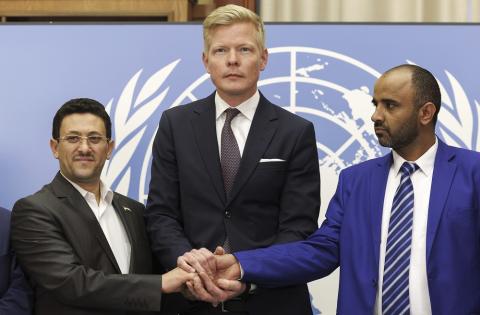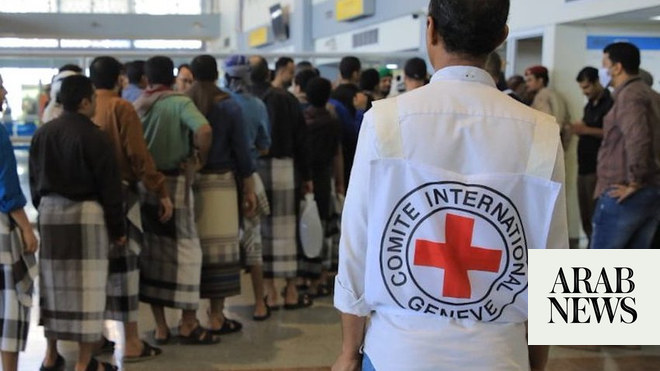
The Houthis had agreed to trade Qahtan for 50 of their militants captured by the Yemeni government.
The current round of prisoner exchange discussions between the Yemeni government and the Houthis began in Muscat on Sunday
AL-MUKALLA: The UN’s Yemen envoy, Hans Grundberg, said on Wednesday that the ongoing prisoner exchange between the Yemeni government and the Houthis in Muscat had made progress toward an agreement that would liberate prisoners of war, including Houthi-held Yemeni politician Mohammed Qahtan.
This happened as a Yemeni government spokesperson said that the Houthis had agreed to trade Qahtan for 50 of their militants captured by the Yemeni government.
Mayy El-Sheikh, director of strategic communications and public information at Grundberg’s office, described the atmosphere of the talks between the two sides as “positive and constructive,” noting that the envoy’s office, which sponsors the talks, is building on progress to push for a deal in Yemen that would see all prisoners of war released.
“The parties have reached an understanding about arrangements to release conflict-related detainees that includes Mohamed Qahtan,” she told Arab News, adding: “The office of the UN special envoy stresses the importance of finalizing this understanding responsibly to achieve tangible results toward releasing conflict-related detainees in accordance with the ‘all for all’ principle.”
The current round of prisoner exchange discussions between the Yemeni government and the Houthis began in Muscat on Sunday, with officials from both sides expressing hope that a deal could be reached to free all prisoners.
Two prior successful prisoner exchange discussions between the two sides resulted in the release of 1,800 prisoners and journalists held by the Houthis.
Majed Fadhail, a spokeswoman for the government delegation, told Arab News on Wednesday that he is optimistic about the discussions’ outcome after the Houthis agreed to trade Qahtan for 50 of their inmates.
“The agreement and understanding around Qahtan is very positive and we are optimistic. I am hopeful that the discussions regarding the specifics and during the exchange of names and other matters will continue with the same level of positivity,” Fadhail said.
On Tuesday, Fadhail said that Yemeni government representatives refused to address other prisoner-related issues unless the Houthis agreed to free Qahtan.
The Houthis kidnapped Qahtan in early 2015, preventing him from seeing or contacting his family. They have refused all attempts to have him released.
The breakthrough in prisoner exchange discussions in Muscat came a day after the Houthis rejected UN pleas to release scores of UN and foreign personnel abducted by the militia during their last campaign.
On Tuesday, Abdelaziz bin Habtour, prime minister of the Houthi government, told Peter Hawkins, the acting UN humanitarian coordinator and UNICEF representative in Yemen, that they would only release abducted UN staffers who were not involved in spying for the US or Israel, defying a previous call from UN Secretary-General Antonio Guterres for the “immediate and unconditional release” of all UN employees.
Last month, the Houthis claimed to have broken a “major American and Israel” espionage network made up mostly of Yemeni individuals working for Western embassies, UN agencies, and other international organizations.
The Houthis also detained around 50 Yemeni UN workers and other international organizations, in a crackdown that drew widespread international criticism.
At the same time, the Sanaa Center For Strategic Studies, a Yemeni think tank, urged the international community on Tuesday to take stronger and more coordinated efforts to compel the Houthis to free the workers and stop harassing Yemenis working with international organizations.
In an essay published on its website, the center cautioned that ignoring the Houthis’ assault on Yemeni aid workers would encourage them to continue their campaign, arrest more individuals, and use them as a bargaining chip.
“But without a comprehensive, coordinated response to ensure all detainees are released unharmed, the detentions will drag on for at least some, if not all, of those jailed. In reality, silence will put their lives in even more danger,” the center said.
It added: “Worse, it could encourage the Houthis to detain even more people as they seek to extract political and financial gain by negotiating terms with each of the organizations separately, or with the international community more broadly … The only way to avert that eventuality is a united stance in which the impacted organizations speak with one voice.”












